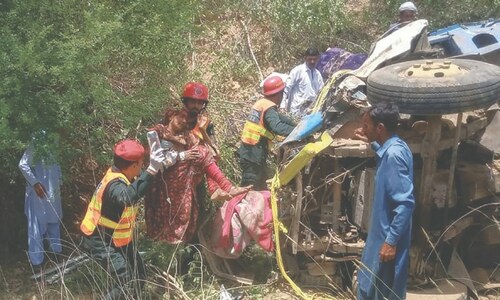KARACHI, March 8: Prime Minister Shaukat Aziz said on Tuesday that India had accepted Pakistan's proposal for an 'energy corridor' and the Indian petroleum minister would be invited for talks on the project. Later, it would be taken up with the Iranian petroleum minister, he added.
"The government is striving to improve Pakistan's relations with all countries in the region, with neighbouring countries in particular," he added. The prime minister was speaking on the main features of the country's foreign policy and the economic situation during a meeting with senior journalists at the Governor's House. Governor Dr Ishratul Ibad and Chief Minister Dr Arbab Ghulam Rahim attended the meeting.
Mr Aziz said that during his visit to India he had made the offer of the corridor to Indian Prime Minister Manmohan Singh, but the latter put forward certain conditions. However, 10 days back the Indian cabinet approved the proposal without any reservations. He said that now the Indian petroleum minister would be invited for sorting out modalities. Similar talks will be held with the Iranian petroleum minister.
About his government's efforts to improve relations with countries in the region, he said that the ongoing process of dialogue with India was making headway. Referring to the Muzaffarabad-Srinagar bus service, he said Pakistan wanted early opening of the road, which would be a confidence-building measure and provide an opportunity to people on both sides of the LoC in Kashmir to meet each other.
He said the government had taken up the Baglihar dam issue with the World Bank. Now India was talking about building the Kishanganga dam. The matter would be taken up with the Indian government before going to the World Bank, he added.
The prime minister termed his recent visit to Iran useful and productive and said that the talks held with the Iranian leadership were producing good results. Iran, he said, had offered $200 million to Pakistan for infrastructure development projects.
He said Pakistan wanted to institutionalize its relations with Iran and a proposed Pakistan-Iran joint investment company and other initiatives would boost economic ties. The prime minister said that talks were being held at present on a proposal for laying a gas pipeline from Iran to Pakistan and India which he termed 'peace pipeline'.
He also referred to the rise in oil prices which had gone up to $52 a barrel in the international market. During his visit to India, he said, he had found that petrol prices varied from city to city by up to 15 to 20 per cent, while in Pakistan petrol prices were the same throughout the country.
He said the government had earlier provided a subsidy of Rs30 billion to Rs40 billion on petroleum products, but now it was not possible to buy oil at $52 per barrel and sold it in the local market at $30 a barrel.
Keeping in view people's problems, he said, the government had adopted the 'mid-course' in order to keep inflation under control, which was between seven and eight per cent.
The prime minister said that investment was on the rise and every manufacturing unit was expanding and adding plants. Increase in investment in manufacturing units would improve the economy and open up new avenues of employment.
He said prices could only be controlled by increasing supplies to meet the demand. However, if some people were indulging in hoarding, action would be taken against them in cooperation with provincial governments.
The prime minister said that a commission had been set up to look into the problems of people with fixed income and its report would be received before the new budget and would be taken into account. He said efforts were being made to create favourable conditions for generating employment in the private sector.
The prime minister also said that new investments were creating employment opportunities, but there were many fields in which the required trained work force was not available. He cited the example of some cities where it was difficult to find masons.
"In Pakistan manpower is available but without any skill." The government, he said, was striving to launch crash training programmes of three to six months to make the workforce productive.
Most of skilled Pakistani labour had gone to the Middle East countries and Afghanistan and now there would be demand for skilled labour from Indonesia. He said that there was also a shortage of contractors for road projects and, therefore, foreign contractors were being invited to meet the requirement.
When his attention was drawn to non-implementation of the Seventh Wage Board Award for journalists, the prime minister said his government wanted an amicable solution to the issue. However, at the moment the matter was before the court and, therefore, sub judice, he added.














































Dear visitor, the comments section is undergoing an overhaul and will return soon.